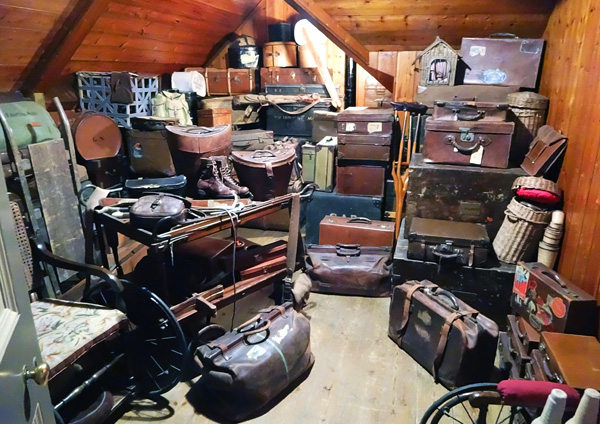
By Andrea Brundage
We like our stuff. We are acquirers and we are accumulators. Many of us think that shopping makes us happy, and sometimes it does. But what happens when we continue this path of acquiring and accumulating, yet we never move out the old stuff? And what are the costs associated with having and storing all this stuff?
Homes are often filled with “had-to-haves” and “it-was-a-great-deal” purchases. Closets are bursting at the seams with clothes, shoes, purses, suits, ties and baseball caps. In kitchens, our pantries and cupboards are overflowing with canned goods and boxed foods, yet many of us eat out at least once a week.
Trends and statistics:
- Garages are frequently used for on-site storage rather than housing our vehicles (which is often our second largest investment).
- Many spare rooms and extra closets are nicknamed “the disaster area” or “the black hole” and have become unusable space for daily living.
- Sales of home organizing products reached $8.5 billion in 2014, and is forecast to surpass $10 billion by 2019.[1]
- In the U.S., self-storage facilities have become a multi-billion-dollar industry. In 2014, these facilities consumed 2.63 billion square feet of land.[2]
- Charity drop-off sites and their associated stores are overflowing with donations, and very often the things that do not sell end up in landfills.
- Landfills are processing tons of our discards every single day.
Tangible costs of acquiring “stuff”:
- The time spent online or at the store browsing and shopping.
- The actual cost of purchasing the item.
- Interest charges, if carrying balance forward on credit cards.
- The waste of throwing away spoiled or expired food.
- The cost of supplies for hobbies and craft projects that do not get completed.
- Space required to store all the stuff.
Intangible costs of acquiring “stuff”:
- Wasted time looking for lost items.
- Embarrassment over condition of cluttered home.
- Guilt over money spent.
- Stress!
If you see yourself in the habit of acquiring and accumulating, and if you are ready to remove the heaviness of clutter, you must start clearing out the excess. Become acutely aware of shopping habits and tendencies to procrastinate putting things away.
Where to begin:
Start clearing clutter with the easy things. Empty boxes, shopping bags, junk mail, newspapers, and toys that have been forgotten or outgrown. Then move on to books, DVDs and CDs that will not be viewed or listened to again; electronics that have been upgraded; clothes that no longer fit or are out of style. Once you get into the groove of letting things go, it will become easier. Set aside time to clear out the things you no longer love, want, or use, and then arrange pick-up or drop them off at your favorite donation spot.
If your home is cluttered to the point of embarrassment, and you find that you avoid being there or you wouldn’t dare have people over, then perhaps it is time to clear the clutter and get organized. The chaos and clutter is standing between you and the priceless memories that are yet to be made, and that is much too high a price to pay!
Andrea Brundage, MBA, is a Professional Organizer & Bringer of Calm. She helps people clear clutter and get organized, at home and at the office. Andrea teaches organizing principles and time management throughout the Valley and she is releasing her first book later this year. If you are ready to turn your “Chaos into Calm” visit professionalorganizeraz.com or call (480) 382-1085.
For more articles about reducing waste visit greenlivingaz.com/waste
[1] Source: packagedfacts.com
[2] Source: sparefoot.com






